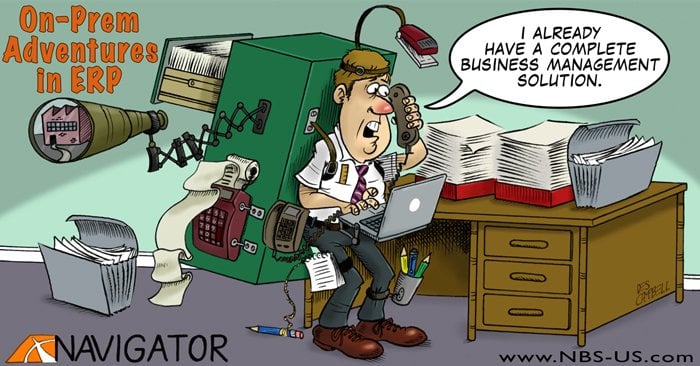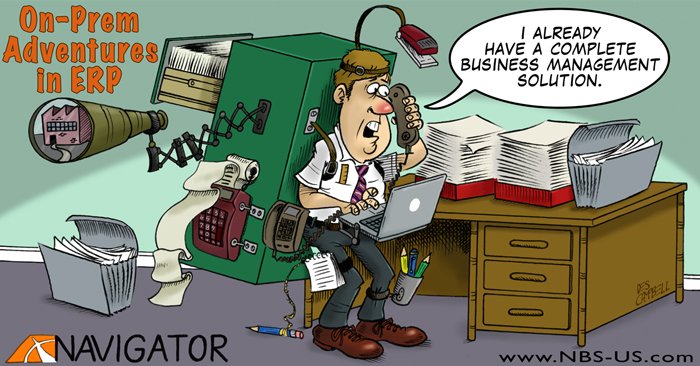
Why You Should Implement the Finest ERP System Available
If you’re looking to find and implement an ERP platform in your business, we know it’s not easy.
In the late 1990s, back when everyone was looking to be Y2K compliant (how quaint that seems now!), one pharmaceutical startup had been working with off-the-shelf accounting software to manage its finances and relied on paperwork to keep track of manufacturing and purchasing. The firm knew it needed stronger operational management and partnered with a large multinational accounting firm to identify the right enterprise resource planning (ERP) solution for its needs. The platform selected was successfully being used by large pharmaceutical companies and appeared to be a decent fit for the startup’s needs.
Turns out that wasn’t the case.
The demo crashed for the startup, but the user team still continued with implementation. The company had been founded by doctors, who should’ve known very well the value of getting a second (or even third) opinion, but they ignored their best practices and stuck with the ERP system because it came endorsed by a consultant.
In the end, it was a terrible decision.
The founder of the startup, which went on to become an extremely successful global pharmaceutical company in spite of this debacle, learned a valuable lesson. The takeaway from that lesson, in the words of the founder: “I would implement the finest ERP system available.”

Identifying Goals and Making Decisions
For a young, growing company, implementing ERP software is a wise choice if you’re looking to optimize your finances and processes. To get the most value from your selection, however, you need a fundamental understanding of your organization’s pain points and the ways in which the system can help improve the business. If you lack this clear understanding, you may end up trying to solve the wrong problems.
For most startups, the main goal is to increase profits through improved operational performance and visibility, and some of the ways this gets accomplished involves removing redundancy, streamlining processes, and gaining automated and detailed visibility into operations and finances via stronger data analytics.
In other words, let the system perform the routine tasks so you can focus on the bigger picture.
Getting the Most Out of Your Investment
The right ERP system should help increase your throughput and balance your inventory according to forecasted need, and should keep operational expenses manageable while growing throughput in the future.
This is where many implementations fail. Startups typically make decisions based on their needs for the immediate future, without thinking far enough ahead about how operations might change. This is why you may hear so much about the importance of scalability when it comes to ERP solutions.
Your resources likely will change in the next five years, and if you find yourself increasingly competing with larger companies, you’ll want the most modern system possible to keep pace with them. For many early-stage companies, a comprehensive but off-the-shelf offering that comes preloaded with an array of features may be a better choice than a customized platform.
So, What’s the “Finest” ERP System?
The truth is that there’s no one perfect solution for every business. Needs differ and ERP implementation is a technologically and organizationally complex project. Some key factors that will influence your success include the ability of the platform to transform your business, compatibility with existing processes and systems, and user buy-in.
Beyond that, your business may be seeking to reduce inventory costs and want to use its ERP system to get forecasting data in real-time for better decision-making. If you’re in the life sciences industry, for instance, you may need a system that makes FDA validation requirements easier. Alternatively, your business needs could be as simple as wanting some financial streamlining and automation for transactions and general oversight.
As you can see, it’s impossible to pinpoint one ERP system right off the bat that can be reliably characterized as “the finest” for your particular business.
Finding the Finest ERP System Involves Having the Right Partner
Getting the best system available involves finding a solutions partner you can trust from the outset. You need someone who will listen carefully to your needs, stay engaged even after implementation, and be responsive with upgrades and problem resolution.
You also need to be as specific and clear as you can when sharing your requirements for the system. If you are too generic, you may find yourself disappointed later in the process. One way you can be successful in this aspect is to have defined business processes and procedures that the ERP system can support. You don’t want to be working around the ERP platform; it should be working for you.
The right solution is going to be flexible. The system should not only increase productivity but also ensure scalability to help your business grow.
Attain Revenue Growth With ERP
As the pharmaceutical startup at the start of our story found, it’s not always easy to find the right ERP solution.
When you’re evaluating what’s available in the market, it’s important to look for a solution that has the right blend of capabilities and pricing for your growing business. It should scale to meet your current and long-term needs, be simple to use, and integrate well with existing processes and software applications.
Getting the finest ERP you can afford for your specific business needs can make all the difference in attaining revenue growth. The right solutions partner can help you examine options and select the right system. Contact one of our consultants at (801) 642-0123 or by emailing info@nbs-us.com for help.

